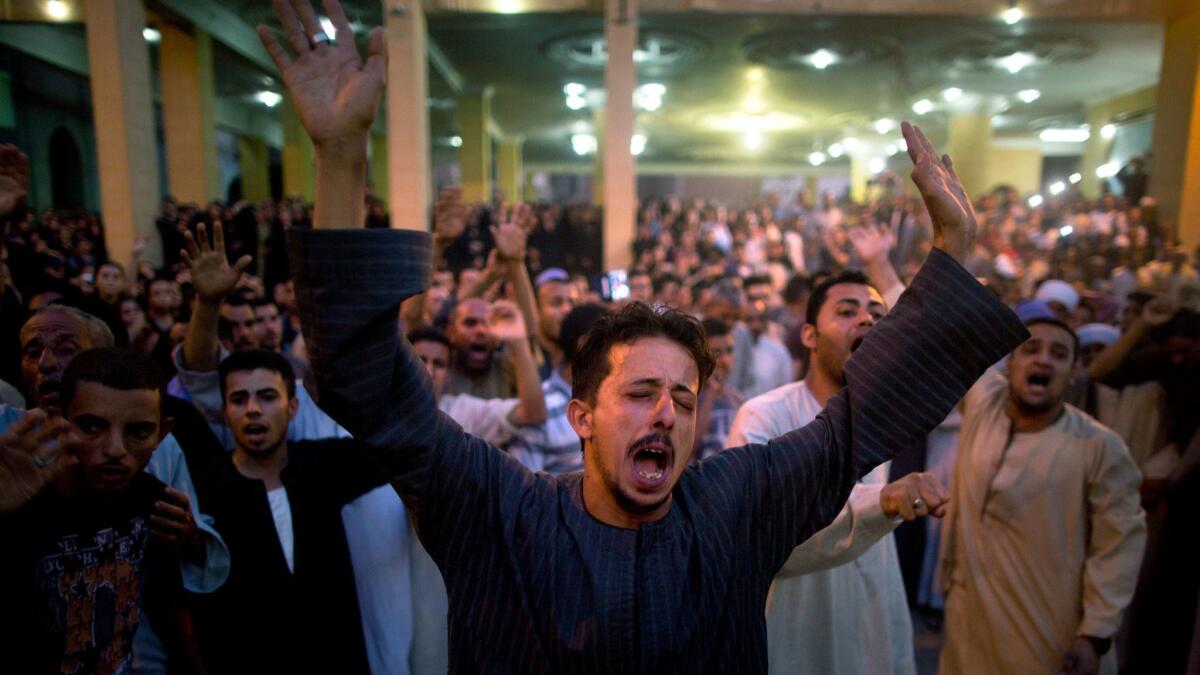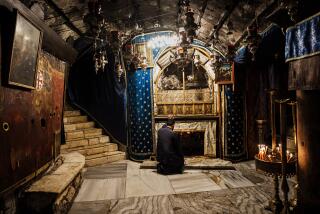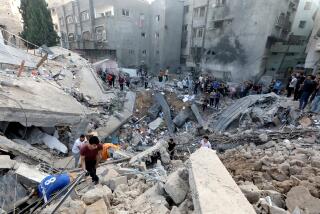Islamic State claims responsibility for attack on Coptic Christians in Egypt that left 29 dead

Reporting from Minya, Egypt — Islamic State claimed responsibility for an attack on a bus loaded with Coptic Christians the day before near the southern city of Minya, which officials said killed 29 people.
“A security team of caliphate soldiers set up an ambush for dozens of Christians as they headed to the church of St. Samuel,” the militant group said Saturday through Amaq, its media arm.
The bus passengers were gunned down on their way to volunteer at a monastery. Another 25 Coptic Christians were wounded.
Friday’s attack, on the eve of the Muslim holiday of Ramadan, led Egyptian President Abdel Fattah Sisi, to launch airstrikes on what officials said were militant training camps in the northeastern Libyan city of Derna. Sisi, a former general, said the gunmen had trained and planned the attack in Libyan camps, although Islamic State has not held sway in Derna for two years.
In a Saturday phone call, Egyptian Foreign Minister Sameh Shoukry told U.S. Secretary of State Rex Tillerson that officials found “information and evidence that terrorist elements involved in the Minya incident trained in these camps,” according to a statement. Tillerson conveyed condolences for the victims, and said the U.S. stands ready “to cooperate with Egypt in the fight against terrorism,” according to the statement.
The military strikes did little to reassure Coptic Christians in Minya, a city on the banks of the Nile about 140 miles south of Cairo where about 40% of the population is Christian – four times the percentage of the Muslim country’s population of 92 million. They have watched with dread this year as Islamic State militants advanced from strongholds in northern Sinai south beyond the capital.
“This is not an isolated incident, it’s an evolution of a problem,” said Bishop Anba Makarios, the leader of Coptic Christians in Minya. “It is difficult to target Copts in churches because they have security and cameras. And in their homes, they live next to Muslims. So the new method is a way to get them alone: They pick a desert road in the heart of the mountain with no checkpoints or rest stops or anything on it so they can target only Copts.”
Many of Minya’s 2 million Christians have felt threatened by local Muslim extremists for years. The Egyptian government historically provided security for the Christian minority, but that dwindled in the final years of longtime president Hosni Mubarak’s rule and seemed to disappear after he was replaced in 2012 by Islamist President Mohamed Morsi. Attacks on churches, led by groups of Islamist extremists, surged.
When Sisi ousted Morsi the following year, Coptic Christians were among his staunchest supporters. Sisi became the first Egyptian leader to attend Coptic Christmas services in Cairo two years ago, and was cheered by the crowd. He returned to comfort victims of an Islamic State suicide bombing that killed 29 people in a chapel beside St. Mark’s Cathedral in December. Islamic State declared a campaign against the country’s Christians soon after, and when twin church bombings killed 47 on Palm Sunday, Sisi declared a three-month state of emergency, vowing to protect them.
This is not an isolated incident, it’s an evolution of a problem.
— Bishop Anba Makarios, the leader of Coptic Christians in Minya, Egypt
But in Minya, residents said their compact with Sisi has failed as they face repeated attacks on the streets, their houses burned and hate graffiti scrawled on the walls of their churches.
More than a hundred Christians have been killed in the Minya area during the last year, Bishop Makarios said. A year ago this month, an elderly Christian woman was stripped by an angry Muslim mob that believed her son was having an affair with a Muslim woman. The following July, another Christian was stabbed to death by a mob. Tensions increased so much that before Easter, Coptic leaders announced they would curtail celebrations to avoid further clashes.
Makarios blames groups like the Family House. Formed to resolve conflicts through tribal negotiations, he said they usually allow Muslim extremists to avoid criminal prosecution by intimidating Coptic minorities into accepting settlements instead.
“The Family House concept needs to be reviewed,” he said. “It needs to have a clear role and a clear separation from other authorities… Reconciliation committees are fine only after the law has been enforced.”
He noted that the government has also been unwilling to allow Copts to open new churches, often on security grounds. In the Minya bishopric, which has a hundred churches, 150 villages have no church, and few new churches have opened, residents said.
Yacoub Malak, a local Coptic priest who helped with funeral services Saturday at Virgin Mary Church, said they have been trying to open another house of worship in a nearby village for 15 years. The day it was due to open in 2002, worshipers were attacked by extremists, who broke the door and windows and ripped up the holy books.
“From this time until now we can’t pray in the church. They prevent us,” he said. “It’s an Islamic country.”
Another priest at the church, Elishaa Lewis, said he tried to open a church in another nearby village, but was initially told it could not be more than a single story, feature minarets or a cross. Worshipers agreed, but two months ago, the local governor still refused them. “It’s unfair. We need to pray. We need a church,” Lewis said, adding that the federal government offers limited protection.
“Sisi can’t do everything,” he said.
Bishop Makarios said the state needs to crack down on Muslim religious edicts, or fatwas, that incite violence against Christians.
“They should also focus on intelligence work to prevent these things from happening. The security apparatuses’ job is not just to investigate after the crime is committed, but also to preemptively stop it from happening. Finally, if there are extremist factions within security apparatuses, these must be looked into as well because they hold significant authority.”
Aied Wanget, a Coptic bookstore owner in Minya, said Copts were instrumental is helping oust the Muslim Brotherhood, and he still supports Sisi’s fight against terrorism as part of an international coalition.
“Muslims kill not only Copts but also police and soldiers,” noted Wanget, 45.
Neighbor Hanaa Yusuf Mikhael also supported Sisi until Friday’s attack.
She had just spoken to her husband, a chicken farmer, on his cellphone Friday before he and her 14-year-old son Mark Habib headed down a remote desert road toward St. Samuel monastery. Moments later, they encountered the bus that had been stopped by gunmen in black masks and Egyptian military uniforms.
The next call that Mikhael, 40, received was from her son, frantic and fleeing with another youth in his father’s truck. Her husband, Aiad Habib, 45, had been gunned down by the Muslim extremists as he embraced his son, shielding him from harm, having refused to recite the Shahada, a Muslim profession of faith.
Mikhael rushed to the scene, but found police and ambulances blocking her way. Officials cautioned her to stay back. She went anyway, and found her husband’s bloodied body in the sand.
“The police were afraid to go in the desert and protect the people because they thought the terrorists were still there,” she said Saturday, as she sat at home with her son.
She vowed to never support Sisi again.
“Strict Muslims attack us and claim we are supporting Sisi and the regime. I need rights. I need justice. Copts have no rights in Egypt,” she said.
Special correspondents Omar Medhat contributed reporting from Cairo, Makarios Nassar from Minya.
ALSO
What’s that drone flying in over the horizon? It’s a scout from Islamic State
She escaped Palmyra twice after Islamic State came to town. But her husband never made it out alive.
More to Read
Sign up for Essential California
The most important California stories and recommendations in your inbox every morning.
You may occasionally receive promotional content from the Los Angeles Times.











